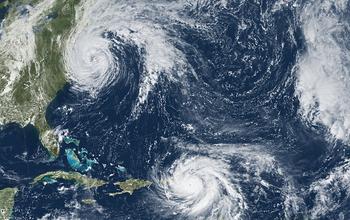Earth Sciences (also referred to as Geosciences), which deals with basic issues surrounding our planet, plays a vital role in the area of energy and raw materials supply.
Earth Sciences comprises subjects such as geology, geography, geological informatics, paleontology, mineralogy, petrography, crystallography, geophysics, geodesy, glaciology, cartography, photogrammetry, meteorology and seismology, early-warning systems, earthquake research and polar research.

A model developed by researchers at Indiana University can help experts address such risks by estimating the likelihood of landslides that will be caused by…

Take a look at the clouds, if there are any in your sky right now. If not, here are a few examples. Watch the billows, the white lofty tufts set against the…

Although clouds grow and dissipate all of the time, scientists think that these low-lying clouds off the coast of subtropical Africa are being disrupted not…

In the area 100 to 1,000 meters below the ocean's surface — dubbed the twilight zone because of its largely impenetrable darkness — scientists found that…

The availability of water from underground aquifers is vital to the basic needs of more than 1.5 billion people worldwide.

Erosion in protected marine areas could threaten plant and animal species and cultural heritage sites. Worldwide, the study found that 24 percent of Earth's…